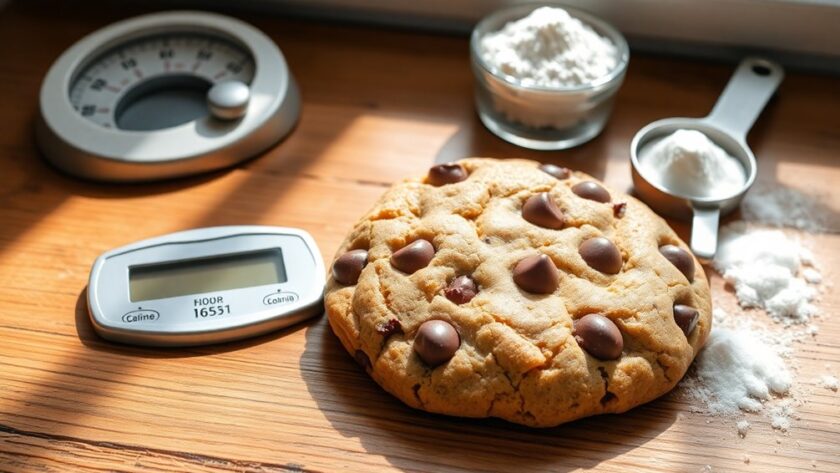A homemade chocolate chip cookie typically contains about 156 calories. These calories are primarily derived from fat, which makes up around 50% of the total, and carbohydrates at about 46%. You'll find that each cookie has around 7 grams of fat, along with 18 grams of carbohydrates, and only 2-3 grams of protein. Sugar plays a significant role in its caloric content, contributing about 20-40 calories per cookie. If you're curious about healthier substitutions or how to lower the calorie content, there's plenty more to explore on crafting the perfect cookie.
Nutritional Overview
When it comes to the nutritional profile of a homemade chocolate chip cookie, understanding its caloric content is essential for those who enjoy baking and indulging.
Each cookie typically packs about 156 calories, which can play a significant role in your daily calorie intake. If you're aiming for a balanced diet, consider how these calories fit into your overall consumption of calories a day. Cookies made with gluten-free flour can have slightly different nutritional values compared to traditional recipes, so it's important to be mindful of ingredient choices. Additionally, using almond flour provides a gluten-free base rich in protein and healthy fats, enhancing the cookie's nutritional profile.
Roughly 50% of the calories come from fat, while 46% are from carbohydrates, and only about 4% from protein. With around 3.97g of fat and 8.13g of carbohydrates per cookie, it's key to pay attention to serving sizes.
Interestingly, the enduring popularity of chocolate chip cookies has led to innovations in recipes that cater to various dietary preferences.
Of course, nutritional values can vary, so always check your specific recipe for accuracy.
Caloric Breakdown by Ingredient
When you whip up a batch of homemade chocolate chip cookies, the sugar you use plays a huge role in their calorie count. Additionally, using alternatives like natural sweeteners can help reduce overall sugar intake while enhancing flavor. The fat sources, like butter and chocolate chips, also contribute greatly to the total calories. Plus, the type of flour you choose can influence how those calories stack up, making it essential to take into account each ingredient's impact. Additionally, using gluten-free options like oats can provide nutritional benefits while still keeping the cookies delicious and satisfying. Incorporating low-sugar alternatives not only decreases calories but also promotes a healthier baking experience.
Sugar Content Impact
While baking homemade chocolate chip cookies, the sugar content considerably influences the cookie's overall caloric breakdown.
In fact, sugar often accounts for 30-50% of the total calories in your cookies. A single cookie might pack about 5-10 grams of sugar, translating to roughly 20-40 calories from sugar alone.
This significant caloric contribution can lead to spikes in blood sugar levels, so it's essential to monitor how much sugar you add.
If you're looking to maintain a balanced diet while enjoying your treats, consider reducing the sugar in your recipe. Doing so can lower the overall caloric content, allowing you to indulge without the guilt.
Enjoy your cookies, but keep sugar in check for better health!
Fat Sources Explained
Sugar isn't the only ingredient that greatly affects the caloric content of homemade chocolate chip cookies; fat sources play an essential role as well.
In fact, about 50% of the calories in a typical cookie come from fats. Here are some common fat sources you might encounter:
- Butter: Contributes around 3.97g of fat per cookie, with saturated fat being a major component.
- Chocolate Chips: The type of chocolate used, like semi-sweet or dark, adds varying amounts of fat.
- Alternative Fats: Oils like coconut oil or margarine can be used, influencing both fat content and caloric distribution.
Understanding these fat sources can help you make more informed choices about your cookie recipes!
Flour Type Influence
Have you ever considered how the type of flour you choose can change the overall caloric content of your homemade chocolate chip cookies?
For instance, all-purpose flour packs about 455 calories per cup, while whole wheat flour offers a lighter option at around 407 calories per cup. By swapping all-purpose flour for whole wheat, you not only cut calories but also boost dietary fiber.
On the other hand, gluten-free flours like almond flour can ramp up the count to about 640 calories per cup. Specialty flours, such as oat or spelt, present their own unique caloric impacts, too.
Ultimately, the flour type you select greatly influences your cookie's caloric density and nutritional profile.
Macronutrient Composition
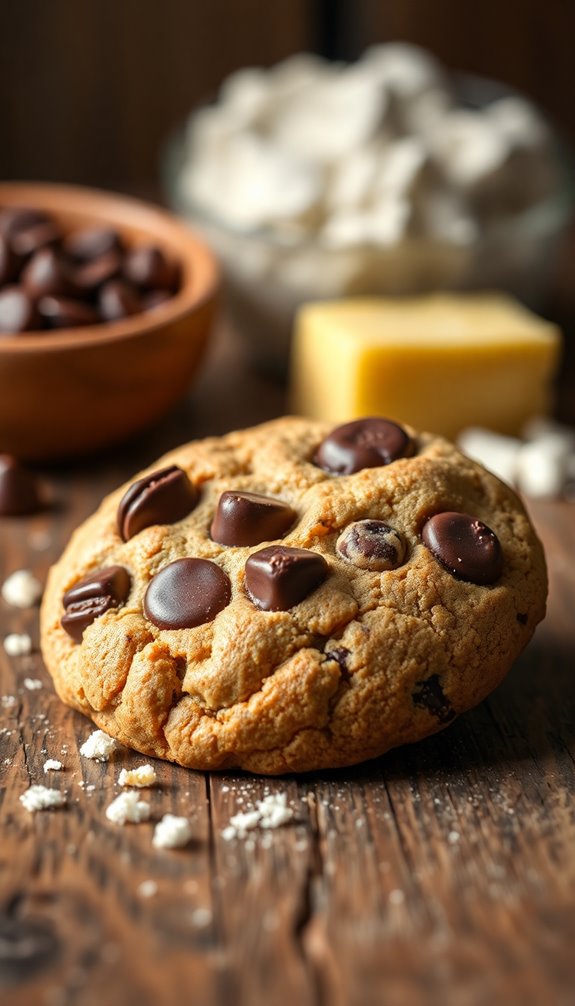
When you bite into a homemade chocolate chip cookie, you're tasting a mix of macronutrients that shapes its flavor and texture.
You'll notice that the cookie leans heavily on carbohydrates and fats, while protein takes a backseat. Many classic cookies, including classic vegan chocolate chip cookies, offer a delightful balance of sweetness and texture that kids love. Additionally, using natural sweeteners in your cookie recipe can enhance the flavor while providing essential nutrients.
Understanding the carbohydrate breakdown, fat content, and protein contribution can help you appreciate what's really in that delightful treat. Additionally, incorporating high-protein cookies into your diet can provide a more balanced macronutrient profile.
Carbohydrate Breakdown
Although homemade chocolate chip cookies are a delightful treat, their carbohydrate content plays a significant role in their nutritional profile. Each cookie typically contains around 18g of total carbohydrates, making up about 46% of its total calories.
Here's a quick breakdown of the carbohydrate composition:
- Approximately 17g of net carbohydrates after accounting for dietary fiber
- Includes various sugars like sucrose, glucose, and fructose for sweetness
- Contains starch, providing a significant energy source
With a calorie density of about 354 calories per 100g, these cookies are relatively high in carbohydrates.
Fat Content Analysis
While enjoying the sweet taste of homemade chocolate chip cookies, it's also important to reflect on their fat content. In a typical cookie, about 11% of the 156 calories come from fat, which totals around 3.3g per cookie.
This fat content analysis reveals that approximately 1.1g is saturated fat, a factor to take into account for heart health. However, not all fats are created equal; some of the fat in your cookie may include healthier monounsaturated and polyunsaturated fats.
If you're looking to make your Chocolate Chip Cookie recipe a bit lighter, think about reducing the butter or using substitutes. This simple adjustment can greatly lower the overall fat content while still delivering that delicious taste you love.
Protein Contribution
A typical homemade chocolate chip cookie packs about 2-3 grams of protein, which accounts for roughly 7% of its total calorie content. This protein primarily comes from flour and eggs, providing essential amino acids.
While protein is important, it's a minor player in the cookie's overall macronutrient profile, especially when compared to carbohydrates, which can make up 46-82% of the calories.
Here's what you should know about protein in cookies:
- Cookies with nuts or seeds can boost protein content to 4-6 grams.
- The protein benefits are often overshadowed by high sugar and fat levels.
- Moderation is key to enjoying cookies while benefiting from their protein.
Fat and Cholesterol Levels
When you indulge in a homemade chocolate chip cookie, you're consuming about 7g of fat, which accounts for roughly 40-50% of its total calories.
This fat content includes around 2g of saturated fat and about 0.5g of trans fat. While these numbers might seem modest, they're important, especially if you're watching your dietary fat intake. Additionally, using gluten-free flour blends can help create alternatives that still taste amazing. Almond flour, for instance, is a popular choice due to its nutritional benefits and gluten-free properties.
Each cookie also contains approximately 10mg of cholesterol, which could be a concern if you need to monitor your cholesterol levels.
It's crucial to enjoy these treats in moderation, balancing your fat consumption with healthier options. Additionally, opting for gluten-free alternatives can reduce the calorie count while offering a delicious dessert experience.
Sugar and Carbohydrates
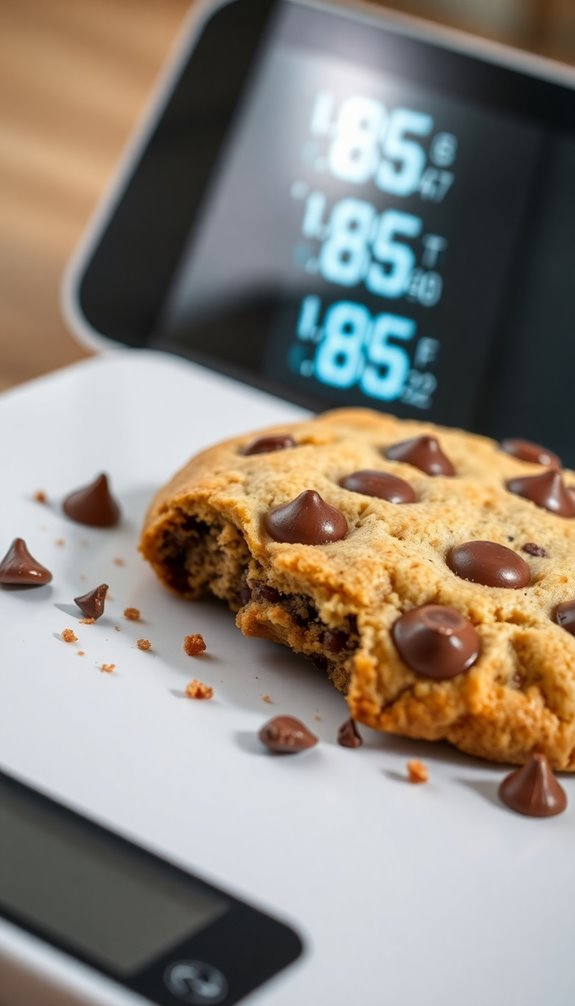
When you bite into a homemade chocolate chip cookie, you're not just tasting sweetness; you're also experiencing a mix of sugars and carbohydrates that play a key role in its overall caloric content. Incorporating natural sweeteners like honey or maple syrup can significantly reduce refined sugar levels in your cookies, making them a healthier option. Additionally, using gluten-free options can further enhance the nutritional profile of your treats. Understanding the different types of sugars and where they come from can help you make more informed choices about your treats. Many recipes can use sugar substitutes that lower the overall sugar content, making them more suitable for those monitoring their intake.
Sugar Types Explained
What makes sugar such an essential ingredient in homemade chocolate chip cookies? The answer lies in the variety of sugars used, enhancing both sweetness and texture.
Here are some common types of sugar you might encounter:
- Sucrose: The standard table sugar, giving cookies that classic sweetness.
- Glucose: Often found in syrups, providing quick energy.
- Fructose: Naturally occurring in fruits, it adds a unique flavor.
When you bake, remember that each cookie contains around 18g of carbohydrates, with about 17g being net carbs.
While sugar offers a delicious taste and instant energy, moderation is key. Too much added sugar can lead to health issues like obesity and diabetes, so consider substituting with natural sweeteners for a healthier option.
Carbohydrate Sources Identified
While many enjoy the taste of homemade chocolate chip cookies, it's essential to understand the carbohydrate sources that contribute to their yummy flavor. Each cookie typically contains around 18g of total carbohydrates, with about 17g being net carbs.
The primary sources of these carbohydrates are sugars like sucrose and glucose, alongside starches. These components account for roughly 82% of the cookie's total calorie content, highlighting its carbohydrate density.
With minimal fiber content at about 0.4g, it's important for you to monitor the added sugars in your recipes. By understanding the types of carbohydrates in your cookie, you can make informed choices, especially if you're managing your sugar intake.
Enjoy those cookies, but be mindful!
Impact on Health
Understanding the impact of sugar and carbohydrates in homemade chocolate chip cookies is essential for maintaining your health. Each cookie packs around 156 calories, with approximately 5.33g of sugar contributing to a high carbohydrate content. This can lead to rapid blood sugar spikes, particularly concerning for those managing insulin sensitivity.
Consider these points when enjoying your cookies:
- Moderation is key to prevent excessive calorie intake.
- High sugar consumption can increase the risk of diabetes and heart disease.
- Balance treats with physical activity for a healthier lifestyle.
Micronutrient Analysis
Although homemade chocolate chip cookies are a beloved treat, their micronutrient content leaves much to be desired. Each cookie contains about 156 calories, primarily from carbohydrates and fats, but when it comes to essential micronutrients, you'll find only trace amounts.
With just 5mg of calcium, 0.1mg of iron, and 9mg of potassium, these cookies contribute less than 1% of the Daily Value for these nutrients. You'll also discover negligible vitamins, like 0.1μg of vitamin D, which is merely 0.3% of the DV.
While the fat content is relatively low, the overall lack of essential micronutrients in homemade cookies highlights the importance of balancing treats with more nutrient-dense foods to maintain a healthy diet.
Health Benefits of Homemade Cookies
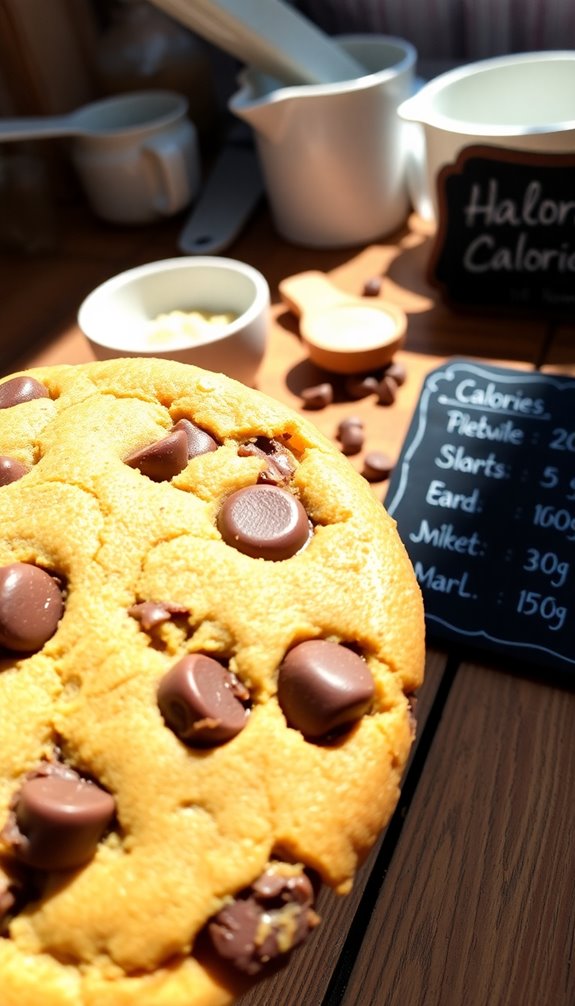
Homemade cookies can actually offer some health benefits when you choose your ingredients wisely. By making homemade chocolate chip cookies, you control what goes in, allowing for healthier options.
Here are a few benefits:
- Whole wheat flour boosts fiber, reducing blood sugar spikes.
- Dark chocolate adds antioxidants, potentially improving heart health.
- Nuts provide healthy fats, protein, and essential nutrients, making your cookies more filling.
Moreover, you can reduce sugar by using natural sweeteners like honey or maple syrup instead of refined sugars.
Plus, homemade cookies eliminate preservatives and unhealthy additives found in store-bought versions, promoting a cleaner diet.
Calorie Burn Comparisons
When you indulge in a delicious chocolate chip cookie, you might wonder how much physical activity it takes to offset those tasty calories. A homemade chocolate chip cookie packs about 156 calories.
To burn that off, walking at a moderate pace of 3 mph will take you about 40-60 minutes. If you prefer running, you can torch those calories in just around 14 minutes at 6 mph. Bicycling at 10 mph is another efficient option, requiring about 20 minutes of pedaling.
Keep in mind, calorie burn can vary based on your weight; a lighter person may burn calories differently than someone heavier. Regular exercise is essential for balancing treats like cookies with your overall energy expenditure.
Baking Tips for Success
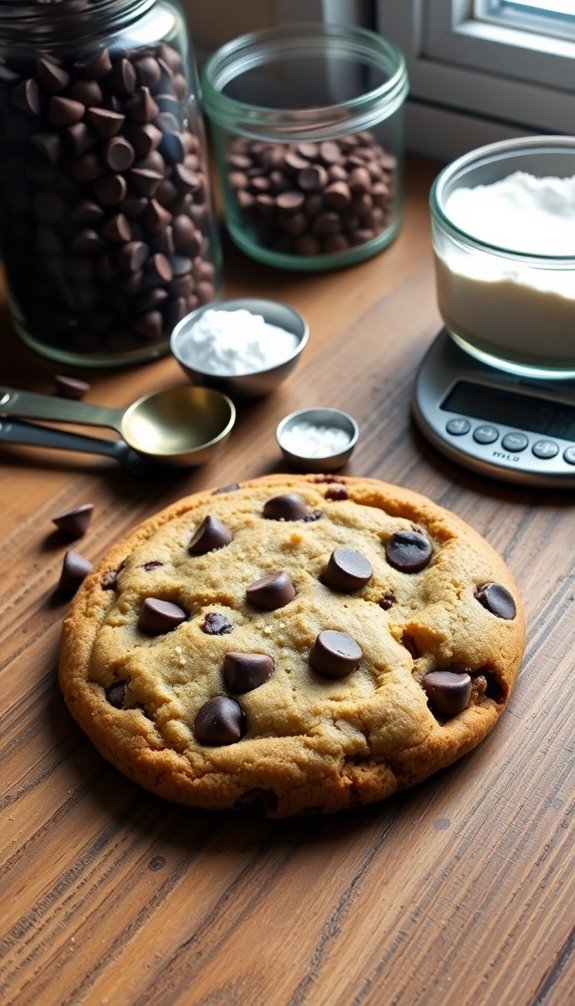
Indulging in chocolate chip cookies is a delightful experience, but baking them successfully requires some know-how. Here are some essential tips to elevate your baking game:
- Use room temperature ingredients like butter and eggs for better mixing and texture.
- Chill your cookie dough for at least 30 minutes to enhance flavor and prevent spreading.
- Space your cookies at least 2 inches apart on the tray for even baking.
Don't forget to experiment with different types of chocolate chips; semi-sweet, dark, or milk chocolate can create unique flavors.
Finally, store your baked cookies in an airtight container at room temperature to keep them fresh.
With these tips, you'll be on your way to baking perfect chocolate chip cookies every time!
Recipe Variations for Healthier Options
If you're looking to make your chocolate chip cookies a bit healthier, there are plenty of simple recipe variations to contemplate.
Start by substituting all-purpose flour with whole wheat flour to boost fiber and nutrient content. Opt for dark chocolate chips instead of milk chocolate to cut sugar and add antioxidants while enhancing flavor.
Incorporating nuts like walnuts or almonds not only adds a satisfying crunch but also healthy fats and protein. You can experiment with natural sweeteners like honey or maple syrup to lower the glycemic index compared to refined sugars.
Finally, consider replacing eggs with flaxseed meal or applesauce in vegan versions, reducing cholesterol and calories while keeping your cookies moist and delicious.
Portion Control Strategies
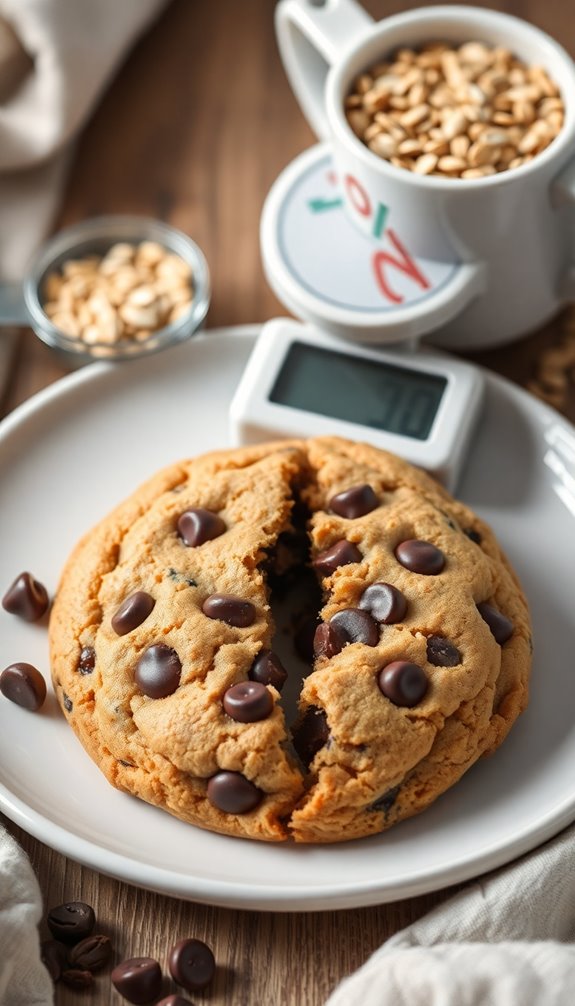
Making healthier chocolate chip cookies is a great start, but managing how much you eat is just as important. Portion control can help you enjoy your treats without going overboard.
Here are some strategies to contemplate:
- Cut cookies in half to enjoy a smaller portion, reducing the calorie count to about 78 calories.
- Use measuring tools, like a kitchen scale or cookie scoop, for uniform portion sizes.
- Pre-portion cookie dough into individual servings before baking to prevent overeating.
Dietary Considerations
While enjoying a homemade chocolate chip cookie can be a delightful experience, it's essential to contemplate the dietary implications. A typical cookie packs about 156 calories, making portion control imperative for managing your caloric intake.
With around 50% fat, 46% carbohydrates, and only 4% protein, you'll want to keep an eye on fat and sugar levels as well. Excess sugar can negatively impact your health, so consider healthier alternatives or modifications when baking.
Also, be mindful of allergens like gluten, dairy, and nuts; always check ingredient lists if you have sensitivities. Remember, a standard medium cookie can considerably contribute to your daily caloric intake, especially if you indulge in more than one.
Consumer Trends in Snacks
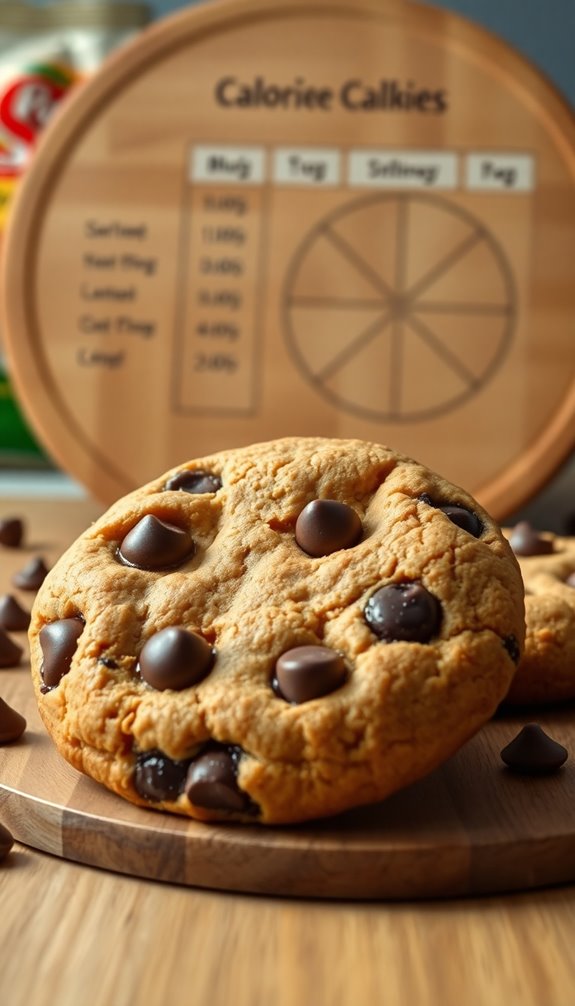
As you consider the dietary implications of snacks, it's clear that consumer preferences are shifting dramatically. More people are looking for options that align with health trends, which are increasingly used for general nutrition.
Here's what you need to know:
- There's a rising demand for snacks lower in sugar and made from whole ingredients.
- Clean label products are gaining popularity, with shoppers favoring recognizable ingredients.
- Gluten-free and vegan alternatives are on the rise, reflecting a desire for inclusivity.
This growing awareness of health and nutrition is leading consumers to prioritize transparency in ingredient sourcing, fostering trust in brands that deliver what they promise.
As a result, the snack landscape is evolving to meet these health-conscious choices.
Conclusion
To sum up, homemade chocolate chip cookies can pack around 150 calories each, depending on your recipe. That's a delightful treat, especially considering that about 50% of those calories often come from fats. If you're mindful of portion sizes, you can enjoy these cookies without guilt. Plus, did you know that nearly 70% of Americans say cookies are their favorite snack? So, go ahead and indulge in a homemade batch every now and then!

